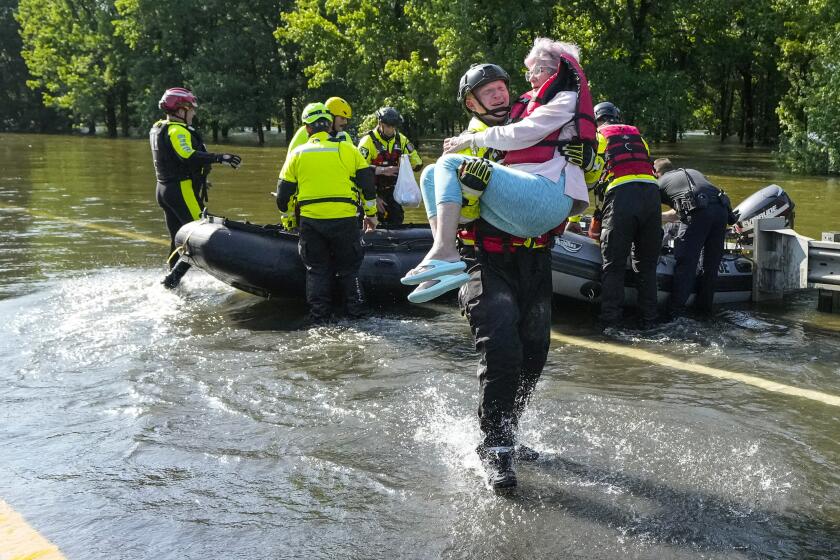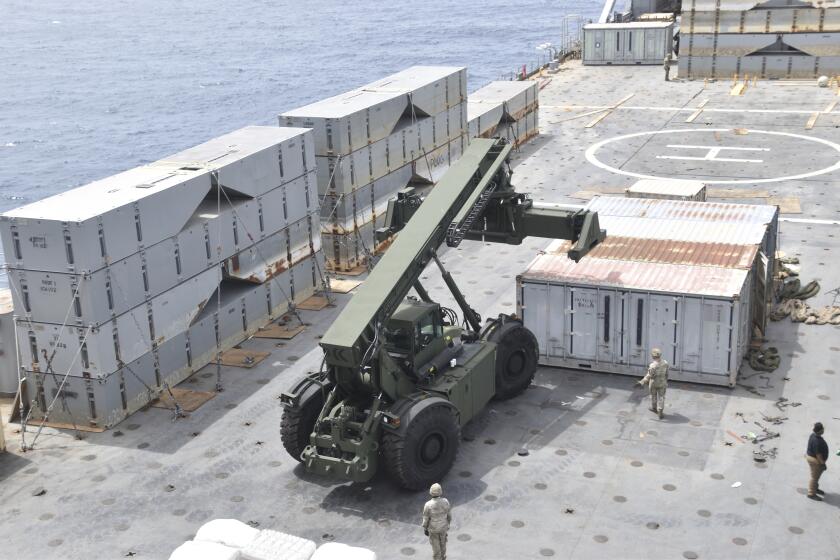NATO Jets Bomb Serb Arms Depot : Bosnia: The U.N. orders the raid near rebel headquarters to punish attacks on Sarajevo. The separatists retaliate with deadly shelling of Muslim enclaves.
In a major escalation of the war in Bosnia-Herzegovina, NATO warplanes bombed a munitions depot of the Bosnian Serbs near their headquarters Thursday and the rebels retaliated with widespread shelling of Muslim enclaves, reportedly killing dozens.
The air strikes near the Bosnian Serb stronghold of Pale were ordered by the U.N. commander in Bosnia to punish Serbian separatists for a deadly barrage this month on the Bosnian capital of Sarajevo.
“The idea was to send a strong political message that the escalating violence in Sarajevo had to stop,” said Fred Eckhardt, U.N. spokesman in the former Yugoslav federation.
The raid by U.S. F-16 fighter planes and other aircraft came as the war in Bosnia seemed to be spiraling out of control.
U.N. peacekeepers have appeared increasingly impotent to stop the fighting, diplomacy has failed and the number of victims has soared.
The North Atlantic Treaty Organization action raises the stakes in the conflict because of likely Serbian retaliation. Indeed, hours after the NATO bombers streaked across Bosnia’s clear springtime sky, Bosnian Serbs fired mortars into the Sarajevo suburb of Hrasnica, U.N. officials said.
Shelling was also reported at four other designated Muslim “safe areas” throughout Bosnia, with the heaviest attacks on the northeastern city of Tuzla. News reports quoted hospital officials there saying that as many as 30 people were killed. Bosnian government officials asserted that the toll was higher, perhaps at least 50 dead.
In the past, Bosnian Serbs have responded to air strikes by kidnaping hundreds of U.N. peacekeepers, making the United Nations shy away from invoking the military option. An estimated 1,600 U.N. troops are stationed in Bosnian Serb territory and are vulnerable to capture.
There were no reports of casualties in Pale from Thursday’s bombing run.
NATO officers, while unable to provide a detailed assessment of damage, said that their mission appeared to have been successful and that all NATO personnel returned to their bases in Italy safely.
A huge cloud of black smoke was visible for miles around Pale. But a Bosnian Serb military commander in Pale said no “vital” targets were hit. He called the strikes a “pure farce.”
A statement late Thursday from the Bosnian Serb army said it now considered the United Nations to have sided openly with “the enemy.”
But Gen. John M. Shalikashvili, chairman of the U.S. Joint Chiefs of Staff, repeated in Washington that the bombing was solely in retaliation for the Bosnian Serbs’ failure to meet U.N. demands and “does not represent in any way a widening of the conflict.”
The order to call in NATO support came after Bosnian Serbs defied a U.N. ultimatum demanding the return of heavy weapons the rebels had seized from U.N. custody.
Both the Bosnian Serbs and the Bosnian government army risk air strikes again if they fail to meet another deadline. The two sides must remove their heavy weapons from a 12 1/2-mile exclusion zone around Sarajevo by noon today.
*
Thursday’s raids followed days of intense fighting and the repeated shelling of the Bosnian capital--including the reported use on Wednesday of phosphorous shells, banned under international convention.
The surge in violence around Sarajevo has claimed dozens of victims, including many civilians.
Lt. Gen. Rupert Smith, U.N. commander for Bosnia, called for air strikes on May 8 after the Bosnian Serb shelling of a Muslim Sarajevo suburb. But he was overruled by U.N. special envoy Yasushi Akashi, confirming the Bosnian Serbs’ notion that the threat of air power was nothing more than a bluff.
Its credibility battered, the U.N. mission in the former Yugoslav republics has come under growing criticism, and there is serious doubt about its future. U.N. peacekeepers increasingly have themselves become targets as both sides in the war, and especially the Bosnian Serbs, openly flout U.N. rules or ignore U.N. authority.
U.N. officials admitted earlier this month that they could not protect Muslim “safe areas “in Bosnia, and they watched helplessly as the Bosnian government army and Bosnian Serbs moved heavy weapons--even tanks--into the exclusion zone where such armament is banned.
*
The crisis reached such proportions that U.N. Secretary General Boutros Boutros-Ghali ordered a full review of the Bosnian mission; plans to withdraw or substantially curtail U.N. involvement are being discussed.
With Thursday’s attacks, the United Nations--and the United States--clearly wanted to signal a tougher stance.
The United States does not want the U.N. mission to end because withdrawal would be costly and would require protection from NATO, involving up to 50,000 troops. In this event, U.S. soldiers might be put in the midst of the fighting in the Balkans for the first time.
Clinton Administration officials have been demanding the use of NATO air power, while Britain and France--countries with the largest detachments of peacekeeping troops in the field at present--have resisted.
President Clinton said Thursday that he “welcomed” the NATO response and said he hoped that it will “convince the Bosnian Serb leadership to end their violations of the exclusion zone and comply with their other agreements with the U.N.”
But previous NATO attacks--seven last year--have had little effect in deterring Europe’s deadliest conflict since World War II. The risks are high because further escalation and repercussions seem so certain.
Tens of thousands of people have been killed and entire village populations forced from their homes in a campaign of “ethnic cleansing” triggered when Muslim-led Bosnia tried to declare its independence from Serb-led Yugoslavia in 1992. The city of Sarajevo has been surrounded by Serbian fighters ever since.
Not only has the United Nations been crippled in the morass, but diplomacy has suffered repeated setbacks. Earlier this week, efforts sponsored by the United States to persuade Serbian President Slobodan Milosevic to recognize Bosnia--a move that would isolate the Bosnian Serbs from their vital Serbian allies and possibly contribute to peace--fell apart.
The Bosnian government has pleaded for air strikes against its enemy on many occasions. Previous attacks, however, were limited and largely ineffective. Regardless of the extent of the damage on Thursday, the symbolism of hitting Pale, a onetime ski center that is headquarters for Bosnian Serb leader Radovan Karadzic and others, was clear.
In his news conference at the Pentagon, Shalikashvili reflected the frustration of U.S. officials at the earlier refusal of U.N. officials to let NATO enforce ultimatums.
“I think it is significant that perhaps this whole level of fighting and the frustration is reaching a point where people are saying, ‘Enough is enough,’ ” he told reporters Thursday.
*
Senate Majority Leader Bob Dole (R-Kan.) said it was “about time” that the United Nations agreed to allow a NATO air strike, but he warned that “it will take a lot more than this one . . . to convince me that the U.N. has been cured of its fecklessness.”
In Pale, as the warplanes approached Thursday afternoon at 4 local time, air raid sirens screamed, schools hurriedly let out, and residents fled for cover.
“It sounded like an ordinary bomb,” said a homemaker in Pale, who was working in her garden at the time of the air strike. She was reached by telephone from Belgrade, capital of the rump Yugoslavia and Serbia. “Then there was black smoke, and all the people began running to shelters.”
In another telephone interview from Pale, Dragana Brezo, an official with the Bosnian Serbs’ self-styled republic, said of the NATO assault: “It was horrible. There was a huge explosion and a big mushroom cloud.”
Times staff writer Art Pine contributed to this report from Washington.
(BEGIN TEXT OF INFOBOX / INFOGRAPHIC)
Air Raid
NATO warplanes bombed an ammunition depot near the Bosnian Serb headquarters at Pale, making good on a U.N. threat to punish the Serbs for shelling Sarajevo. The rebels retaliated with the deadly shelling of Tuzla and other Muslim enclaves.
More to Read
Start your day right
Sign up for Essential California for news, features and recommendations from the L.A. Times and beyond in your inbox six days a week.
You may occasionally receive promotional content from the Los Angeles Times.







